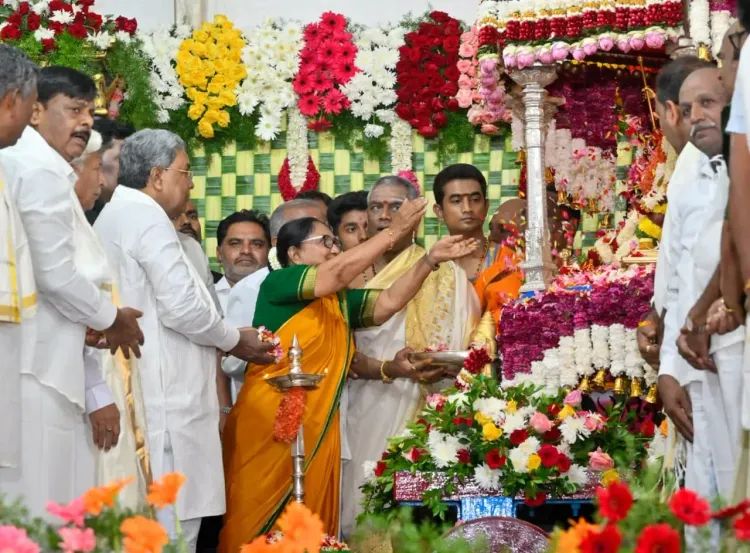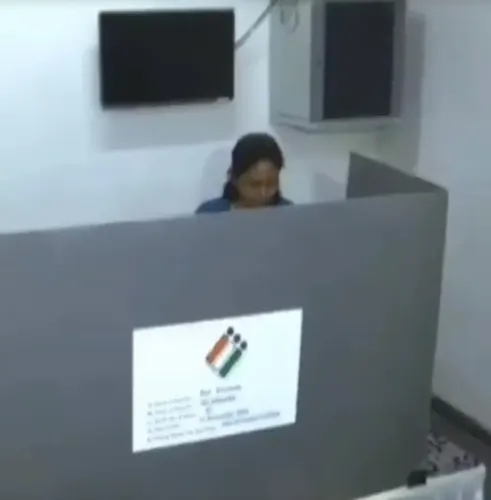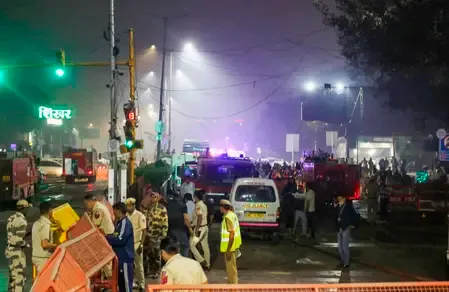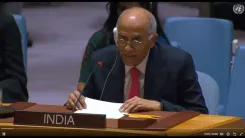Did Mother Chamundeshwari Invite Banu Mushtaq to Dusshera?

Synopsis
Key Takeaways
- Dusshera is a celebration of cultural unity and integrity.
- Banu Mushtaq highlighted the significance of inclusivity in her address.
- Mother Chamundeshwari symbolizes strength and empathy.
- The festival serves as a reminder of peace and harmony in a divided world.
- Mushtaq's biography 'Booker Banu' will share her experiences and insights.
Mysuru, Sep 22 (NationPress) Booker Prize winner and activist Banu Mushtaq, during the inauguration of the historic Dusshera festival on Monday, expressed that Mother Chamundeshwari "herself has invited me to her abode." She emphasized that Dusshera is not merely a festival; it represents the essence of this land, a moment of inclusivity for everyone, and a celebration of integrity.
Speaking to the audience from the heights of Chamundi Hill in Mysuru, Mushtaq remarked: "Today, I commence the grand Dusshera festival with the blessings of Mother Chamundeshwari. I had previously mentioned that a close friend had made a vow at the Chamundi temple. When I received the invitation from the government to inaugurate Dusshera, I felt that Mother Chamundeshwari was inviting me through the Karnataka government."
She further stated, "Despite various challenges and the historical context of our state, Mother Chamundi has ensured that I stand before all of you today."
"This is the most cherished moment of my life, to share this significant, sacred time with all of you, under the watchful gaze of Mother Chamundi. Dusshera transcends being just a festival; it embodies the heartbeat of this land. It celebrates culture, inclusion, and integrity," she reiterated.
Mushtaq highlighted that everyone born in this land has ownership, responsibility, and treasured memories. "This festival evokes the rich heritage of the Mysuru kings, the culture, and the generosity of the Kannada people and language. Our culture celebrates diverse voices and carries the fragrance of integrity. Dusshera is a celebration of our collective culture."
She noted, "The Urdu-speaking community of Mysuru has named all the days of Navratri in Urdu, referring to Vijaya Dashami as ‘Silingan.’ This has become an integral part of their culture and literature. This festival is a collective celebration for everyone."
Mushtaq reminisced about her uncle, Sipayi Mohammad Ghouse, who served as a personal guard to the Mysuru king, stating, "I take pride in this. While many personal guards existed, Maharaja Jayachamarajendra Wadiyar trusted a Muslim without hesitation, appointing him as his personal guard."
Describing culture as “a bridge that connects hearts,” she remarked that it does not promote hatred but aims to spread love. "Our beliefs and way of life are primarily confined to our homes. We are always in favor of life. The culture of this land reflects an inclusive mindset."
"Today, as the world veers towards conflict, the Mysuru Dusshera serves as a reminder that this state is a sanctuary of harmony and peace, a garden for all faiths," she asserted.
"We must respect democratic values and all cultures. Let the essence of integrity emanate from this land to others. May the strength of Goddess Chamundeshwari guide us all. She symbolizes courage and empathy; may she vanquish hatred and intolerance," she emphasized.
Mushtaq expressed her desire for Dusshera to transcend Mysuru, the state, and even the nation. "It should ignite a beacon of peace, empathy, and justice. Life has imparted many lessons to me. I am always for life – akin to the shade of a tree. We must cultivate life through ‘letters’ and not with guns, fostering love instead of hatred," she urged.
"Democracy is more than just a system; it embodies values. It involves respecting every voice and engaging meaningfully with others' lives. Upholding democracy is our duty. We are all united—just as the sky does not discriminate, and the earth embraces all. It is humans who create divisions; we must dismantle them. Let Dusshera illuminate hearts worldwide," she stressed.
Mushtaq concluded, "Goddess Chamundi embodies the tremendous strength of women. She signifies the indomitable spirit of womanhood. Women represent more than just motherhood and tenderness; they also symbolize the fight against injustice. I draw strength from her."
"Reflecting on history, the vision of the former king Nalwadi Krishnaraja Wadiyar becomes pertinent. He valued the concept of equitable resource distribution—political, economic, and social. Resources flourish when they are shared," she explained.
"Everyone deserves an equal share, and the principles of Babasaheb Ambedkar should enlighten all hearts. I have participated in countless events, lit numerous ceremonial lamps, and received garlands on various occasions. My biography, 'Booker Banu', will be launched tomorrow (Tuesday), where I recount my experiences and interactions with Hindu traditions and communities," Banu Mushtaq remarked.
"I express my gratitude to Chief Minister Siddaramaiah for inviting me to inaugurate Dusshera despite the challenges and for his unwavering moral support," she concluded.
Subsequently, discussing her controversial remarks regarding Hindu practices and the Kannada flag, Mushtaq clarified: "My way of praying or my relationship with God is a personal matter. Religious practices have always remained private. I respect all religions and hold them in high esteem. I urge people to understand my statements in their entirety by viewing the complete video. I request the media not to distort my words by presenting only fragmented excerpts."









